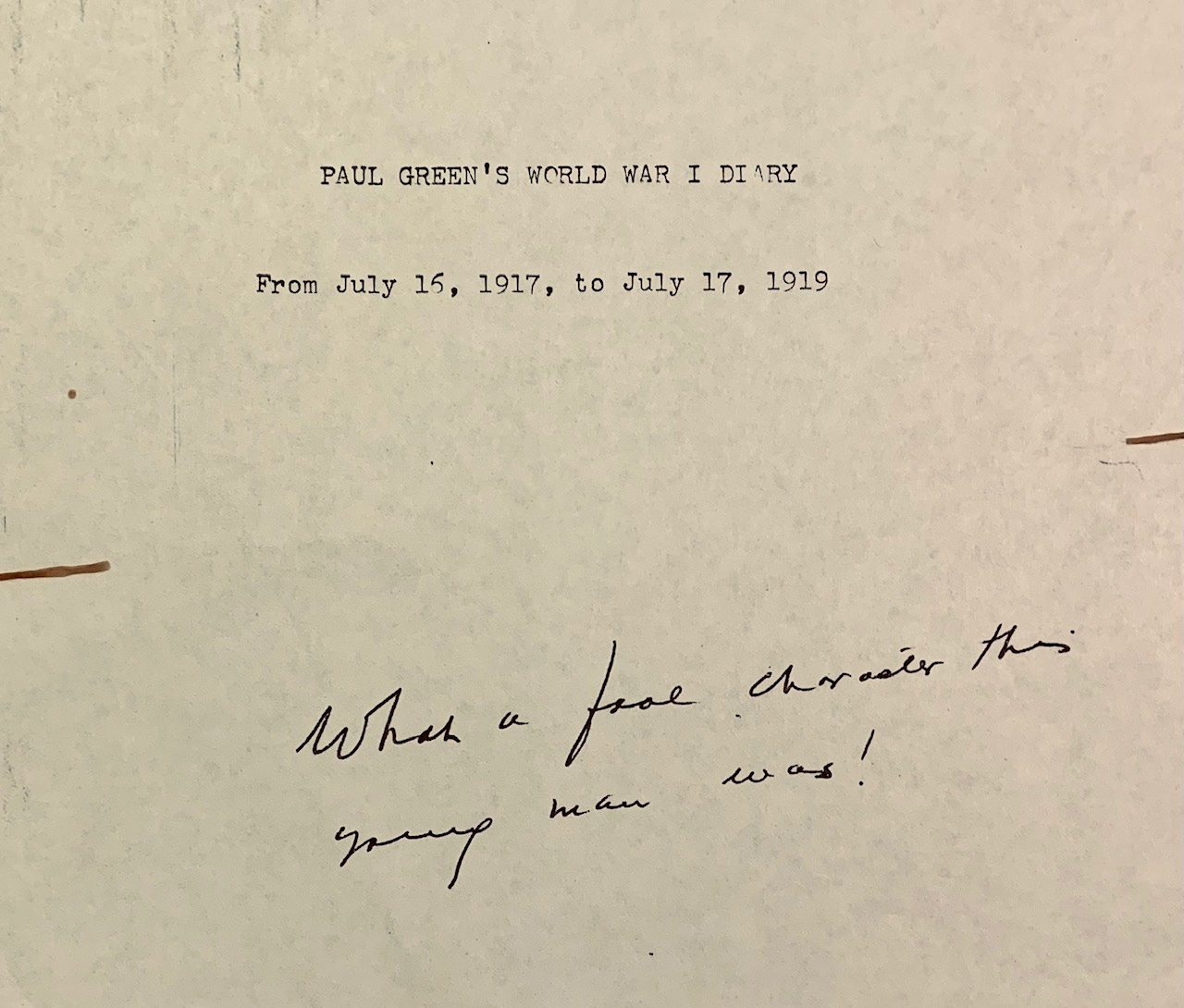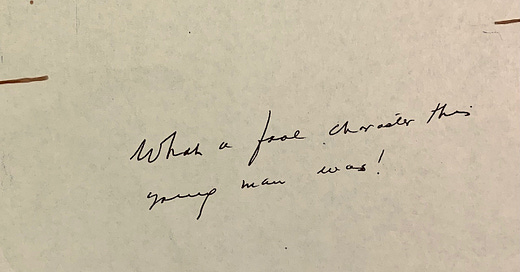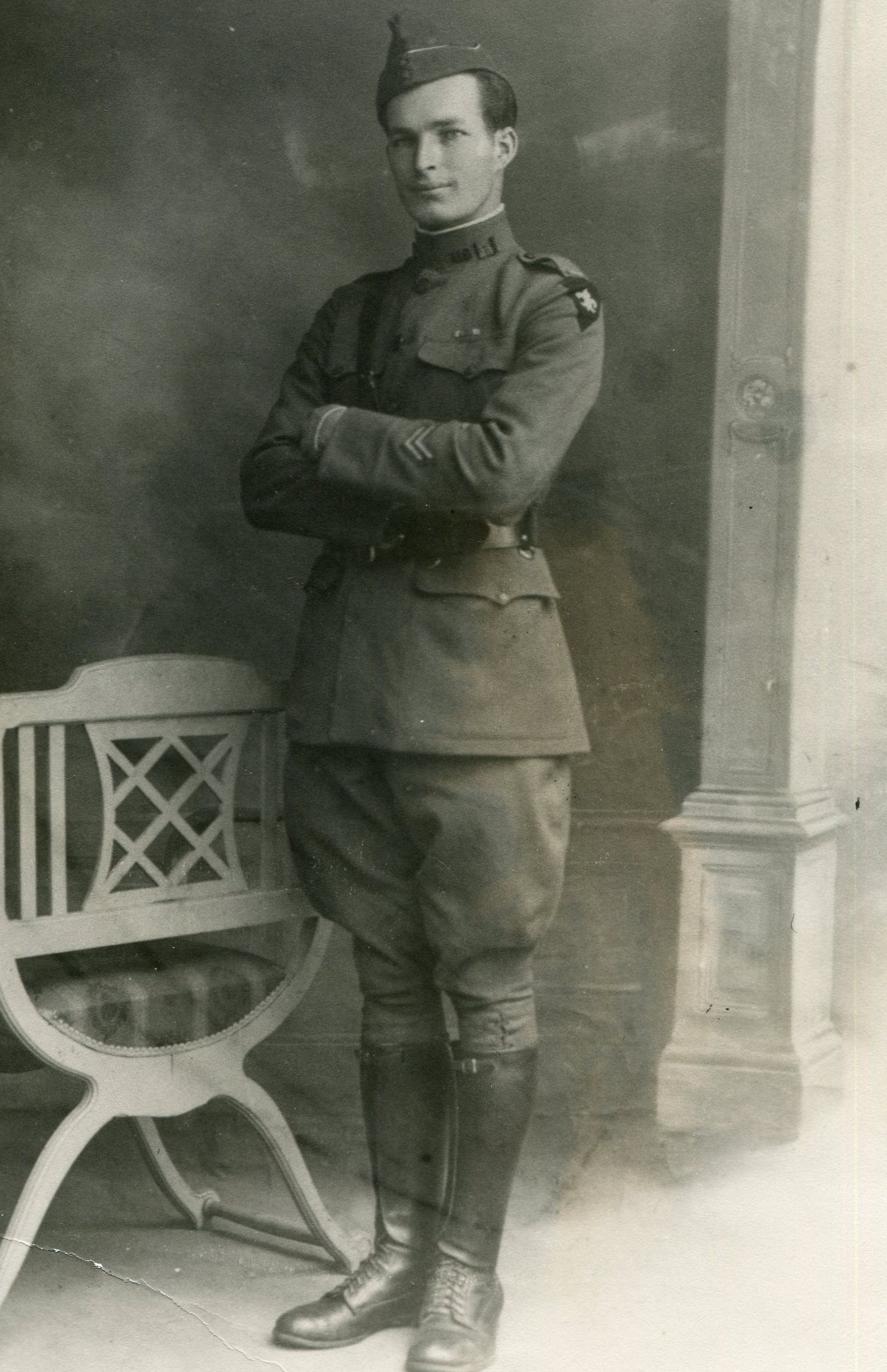This month’s entry from Paul Green’s 1918 diary begins in late May in New York City. Though Broadway is dark in this time of war, the future playwright experiences the city with utter delight. His Army unit is finally on the move toward their destination, the battle front in France, where British and French troops are taking a beating by the Germans.
Green moves into clipped sentences to record the essence of his days of travel which are not without amusement, but soon the atmosphere changes as the reality of war comes closer. The month of June is all anticipation, and Green manages to paint a powerful picture in shorter and shorter strokes, quickening his reader’s pulse and suggesting the horrors to come. The absurdity and terror of the experience is palpable.
May 23rd
Have just returned from a visit to New York City. What did I see there? Later I will describe it. Life! Life! in its every form! and such a silence on Broadway!
May 24th
Received orders today to pack up. Tonight all rolls are made ready for the trip to where we know not. There is a report current that we are going to some city in Canada.
May 25th
Now passing through Vermont, going northward. Left N.Y. this a.m. Country beautiful. Think of Cooper’s “Deerslayer” etc., as we approach Lake Champlain. A movie actress kissed a lot of the boys when the train was waiting at a little depot. I lined up to get mine but failed when the train moved on. “That’s Mary Pickford,” one of the soldiers said. Patriotism!
May 26th
Men grouchy today. Food gave out yesterday. Will arrive at Montreal this p.m.
May 27th
Safely on board transport “Talthygius,” a Canadian ship of some 3,000 tons. Dirty ship. Once a cattle boat.
May 30th
Now in Cabot Str. Snow visible in Newfoundland. Spouts of three whales sighted.
June 1st
Last night finished taking on supplies. This a.m. at 10 o’clock the eight big troopships got under way and slipped quietly down the harbor past the city and out in the seas under cover of heavy fog. Tonight we are 100 miles to sea, headed for Liverpool. Soldiers suffering from the rolling of ships.
June 2nd
Weather rougher. Heavy fog. Fog horns constantly sounding. Seasickness attacking almost all on board. Suffering of men in hold is acute. The place is dirty and damp. The vomiting of the men at meals complicates matters.
June 4th
Weather moderated. Everybody cheerful. The big ships slip through the sunny seas as merrily as you please, as if danger did not wait out there. At dusk the boys gathered around and such songs! The old, old tunes we loved. “My Bonnie” and others.
June 6th
Weather wonderful. Everyone cheerful and yet anxious to be on firing line. Received wireless about 3 p.m. that submarine off American coast had destroyed 13 ships. News depressed everyone. We still hope the report may be false. Clouds rose in the west near night. Sunset beautiful —worthy of Raphael’s appreciation.
June 10th
Tonight we had clog dancing. Contest on deck. Much fun. Everyone tired of sea, wishing to be on land. Few have good appetites. Long for grits and bacon again.
June 11th
At 10 a.m. we were attacked off coast of Ireland by submarine. Sub was destroyed on second appearance above water by several depth bombs. Tonight we are in Irish Sea. Dangerous place, no lights above deck.
June 13th
Speed of trains last night remarkable! Served hot coffee at Rugby. Passed through London 1:30 a.m. Town dark and mysterious. Danger from air raids. Arrived in Dover at dawn. March one mile to Dover Castle with heavy pack. Tired oh! Many English soldiers here from front. Some wounded, many diseased… Girls do not dress in American expensiveness. No silk hose…Cliffs beautiful, imposing.
June 14th
After few hours of sleep, march two miles to wharf; were packed thick as hops on small ship of 1600 tons and sped across the channel to Calais. March three miles to sandy plain. Wind made it awful. Men dirty as devils. Got huge amount of rations. Ate like wolves. Sleep tonight, 15 men in small tent. Expecting air raids tonight. Bottom of tents three feet below surface. Cooties after men. Fun, anger, hate and a little nervousness are in the mental state of men tonight.
June 15th
Hike to Calais this a.m. Drew new Enfield rifles. Town shows evidence of recent air raids. Seven German airplanes passed overhead two miles high, going toward England. Beginning to go to devil in general. Anxious, anxious to go.
June 16th
Hiked six miles eastward from Calais to Ordnance Dept. Drew gas masks and took gas. Received ammunition (100 rounds) and helmets. Country along canals well cultivated, crops excellent. Observation posts camouflaged situated all around Calais several miles out. Peasants seem to be very poor. Oh, the black robes I saw today. Women do not smile ever. Leave for American Training Camp tomorrow. So they tell us.
June 17th
Packs were inspected this a.m. preparatory to leaving. Camp policed. Ate dinner, slung packs and marched to State Pontenessit, three miles from camp. Passed through Calais. Many buildings destroyed. Recent air raids. Took train to Nortkerque, a small villa. Billeted in barns. Slept in hay…
June 18th
Ate a light breakfast (had no supper) and began march to une petite ville, 15 kms. W.W. of Nortkerque. Journey awful. Great distress on account of heavy packs. Nearly a hundred men fell out. Packed billets about 3 p.m. Got quarters in barn. Chicken mites worry men great deal. Rations slight. Men grumble.
June 19th
Slept like a log last night despite mites. Did little work today. Drilled for one hour. Men almost fought over food. Heard one of our Majors (30th Div.) having been gassed. Died. Can hear guns at front. Hell there. But I like this. The beautiful lanes of France, the birds singing in hawthorn hedges, the peasants working in the fields contrasts with our aims. Madness.
June 20th
Guns roared all night in direction of Boulogne. Nothing of much interest today. Began our training under British. Thorough and systematic. Rations increased. Men cheerful. My platoon taking great interest in training. More 30th Div. officers reported killed at front.
June 21st
Took platoon to drill grounds (2 km.) for regular school in bayonet, musketry, gas mask, machine gun, and drill. Afternoon whole regiment assembled at secluded spot for lecture in bayonet under Scottish Colonel. Guns silent at front. One officer and our 1st Sgt. went to firing line tonight. Platoon Sgts. to go next. Anxious to go.

June 22nd
Went thru daily school work. Inspection of feet, guns, and sidearms in afternoon. Free remainder of day. Terrible bombardment on front during night. Guns roared all night long.
June 23rd
No work today. Washed a few clothes and lounged around billets. Peasant woman gave us good wine at dinner. They are very kind to us.
June 24th
Went through usual duties of bayonet, gas, etc. Went to lecture on mines in the p.m.
June 25th
Wore masks this a.m. for two hours. Awful. Several men grew sick and had to remove masks vomiting. After supper we received our pay. Drunkenness followed of course. Several fights. Cash seriously cut.
June 26th
Wore gas masks again today for 2 hours. Took a hike with them on. What a shame that men have to suffer so! In afternoon hiked 8 miles to get bath.
June 27th
Took another hike today with gas mask on. Went thru usual school work. This afternoon received orders to pack up; leave for American sector tomorrow.
June 28th
Left Alendon 7 a.m.; full packs. Whole regiment moved. Hard march. Marched about 12 mi. in direction of Ypres. Pitched pup tents in Mesand. Had only one blanket for night. Slept cold. All night bombardment on front was so heavy as to shake ground.
June 29th
Struck tents and began marching at 9 a.m. Reached Arques this p.m. Billeted tonight in old barn. Bombardment terrific at front. Move on up towards Ypres tomorrow.
June 30th
About midnight last night an air battle took place about a mile to south of Arques. Big moon, great search-lights played in the sky. German plane caught on fire, brought down. Rolled packs at 7 a.m. Struck road towards Ypres. Reached little town three miles east of Cassel at 4 p.m. Making over 20 km in one day. Feet of men in terrible condition. Pitched tents in meadow.
In the next edition of Paul Green’s Cabin, the playwright moves to the front lines of “the war to end all wars” and suffers what was then called “shell shock.” We recommend that students map out his journey through this section of the diary and prepare to read more about the effects of this war on a generation of young men who could not possibly anticipate what they would see on the battlefields of France and Belgium.






Thank you Georgann. I never read the diary. Fascinating and scary to learn all this detail! Betsy